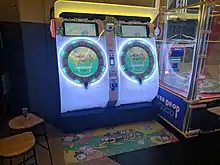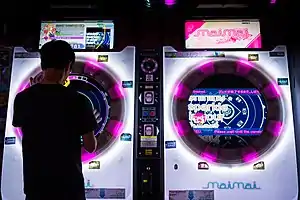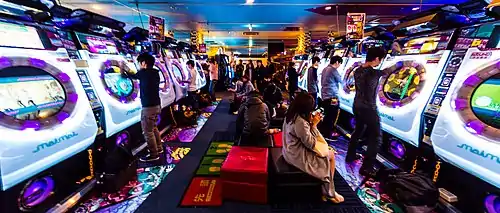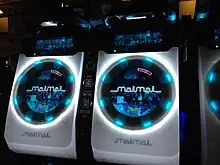Maimai (video game series)
Maimai (stylized as all lowercase) is an arcade rhythm game series developed and distributed by Sega, in which the player interacts with objects on a touchscreen and executes dance-like movements. The game supports both single-player and multiplayer gameplay with up to 4 players.
| maimai | |
|---|---|
 Maimai DX Splash cabinet | |
| Developer(s) | Sega |
| Publisher(s) | Sega |
| Composer(s) | Hiroshi Kawaguchi |
| Series | Performai |
| Engine | teaGFX (original to Finale) Unity (DX) |
| Platform(s) | Arcade |
| Release | maimai
|
| Genre(s) | Rhythm game |
| Mode(s) | Single-player, Multiplayer |
| Arcade system | RingEdge 2 (original to Finale); ALLS (DX above) |
The game is mainly available in Japan, later with an English-language version available to overseas regions including Taiwan and Hong Kong[1][2] and a simplified Chinese version for China.[3]
The Pink Plus version of the game was location tested in the United States at Dave & Buster's in Irvine, California in December 2016,[4] and was also tested at Round 1 in Puente Hills, California in January 2017.[5]
In a livestream on 10 July 2019,[6] Sega announced maimai DX, a reworked version of the game which featured new, second-generation cabinets. This version subsequently generated several sequel games of its own.
After the phaseout of the older "classic" cabinets, many made their way to Europe and North America running the Finale version as offline-only builds.[7] In the US, several of these cabinets were installed at Round 1 locations in 2021. While in Europe, arcades like Arcade Club began to install them into their locations starting around 2020.[8]
Overview
The defining feature of maimai's arcade cabinet is its striking resemblance to a front-loading washing machine.[9] Early advertisements and promotional materials had different joke catchphrases sprinkled in, such as "It's not a washing machine!" and "No water." At its first deployment test, maimai had "NO WASHING" written on its cabinet. Early in development, the original concept was actually a music player, instead of a rhythm game. Up to 2 players can play per cabinet, and up to 4 players can play together with more cabinets. The motherboard can be accessed using the back door on the player 2 side. The original design was made in collaboration with Electronics manufacturer Sharp in Sega's maimai LIVE 2014 Washing Festival event.[10][11][12]
To save their personal play data, players can use an "Aime" IC card with the machine to log into their account.[lower-alpha 1] From October 25, 2018 onward, other IC cards from other developers such as "Project DIVA" and "BanaPassport" cards will also work with maimai.
Using a computer or smartphone, a player can use maimaiNET (now maimai DX NET) to access detailed information on their account like scores and earned achievements as well as change their account name. Before maimai DX was released, it was possible to link a niconico account to upload a recording of the play from the camera built into the arcade machine. Even without a niconico account, the player could view the recording. However, in the summer of 2019, this integration was removed with the release of maimai DX, and a camera and photo gallery was added instead, where commemorative photos at the end of a song could be saved instead. The recording function was completely removed in favor of the photos.
Since the cabinet uses only one computer for both players, if a player is already playing on a machine, the second player's input will not work at all until the end of the game. The background image during this time states "Please wait until the play is finished" alongside the music video of the currently playing song if there is any.
Basic gameplay

Various kinds of notes will appear at the centre and approach the outer rim of the circular touchscreen. The player must tap, hold or slide on the touchscreen or surrounding buttons in time with the music, depending on the type of note.
There are 5 types of input-timing judgements (ranging from least to most accurate to timing): 'Miss', 'Good', 'Great', 'Perfect' and 'Critical Perfect', as well as showing if they are 'Late' or 'Early'. In-game settings[lower-alpha 2] can be toggled to enable different displays to show the different types of judgements based on the player's preference
The types of notes in the game include:[13]
- Tap: A pink circular ring, requiring a single tap when it reaches the edge of the screen.
- Hold: A pink hexagonal bar, requiring holding for the entire length. Releasing early, or releasing midway and pressing down again will result in less score/accuracy and a 'Fast/Late Perfect', 'Great' or 'Good' rating for the object.
- Slide: A star followed by a path. The star counts like a tap, followed by a slide path starting one beat after the star is tapped. The player must trace along the path.
- Paired:[lower-alpha 3] A combination of two (or more) tap, hold or slide notes, now colored yellow in order to signify them being needed to be tapped at the same time.
- Touch (DX only):[lower-alpha 4] A blue note (yellow when two or more notes) in the middle area of the screen that requires a single tap when the outside arrows close in.
- Touch Hold (DX only):[lower-alpha 4] A multicolored note in the middle area of the screen that requires holding for the entire length.
- Break: A red-yellow ring/star that requires a single tap and provides extra score/accuracy when tapped, requiring a 'Critical Perfect' for the full score of the note. Breaks can be paired with either a normal Pair note, or another Break note. As of maimai FESTiVAL, new songs can also include Hold and Slide paths that are Break notes, carrying extra accuracy.
- EX:[lower-alpha 4] Non-Touch/Slide path notes (including break notes) that glow brighter than other notes. Any non-'miss' judgment is a 'Critical Perfect', unless it is an EX Hold note that has been released early, which results in lower accuracy as per usual.
Many players wear gloves during gameplay, in order to dampen the impact of hitting buttons and allow for easier sliding on the glass screen, as well as to avoid injuries caused by friction at higher levels of play.[13][14]
Songs
Along with officially licensed songs from popular artists, vocaloid songs, Touhou Project arrangements, songs from other Sega video games, and maimai original songs are also often added to the library. Each song has a unique background image, and in some cases may be the original PV corresponding to the song. Currently, songs in maimai are sorted into categories based on where they originated from, with the main categories being:
- POPS&ANIME: J-pop songs and anime soundtracks.
- niconico&VOCALOID: Songs originally uploaded to the site niconico, or using the vocaloid voice synthesizer.
- 東方Project (Touhou Project): Arrangements of Touhou Project soundtracks.
- GAME&VARIETY: Songs originating from other games, as well as songs that do not fit in any other category.
- maimai: Songs exclusively commissioned for maimai.
- ONGEKI&CHUNITHM: Songs originating from ONGEKI and CHUNITHM, rhythm games also developed by Sega.
They may also be found in other categories for reasons like events and new releases.
Each song in the game has four to five playable difficulty levels. The four regular difficulty levels are: Basic, Advanced, Expert, and Master.[15] Master mode is only unlocked upon achieving an S rank (97% and above) on the 'Expert' difficulty of a song.[16] Alternatively, an S rank on the 'Master' chart of the song (if available for selection) will unlock the 'Master' chart itself. A Re:MASTER mode is available for selected songs and will be unlocked after achieving a Rank S score on the 'Expert' or 'Master' difficulty. (S ranks achieved before the addition of Re:MASTER mode on songs will not be counted).[17] An exception to this is songs added before maimai DX, whose Master and Re:MASTER charts are unlocked by default without requiring any other conditions. Some songs are also hidden, and only unlocked when certain conditions are met.
in addition to the above difficulty levels, each song is also assigned a numerical level, on a scale of 1 to 15. With the exception of level 1-6 and 15, there is also a harder "+" equivalent for each level (e.g. 7+, 9+, 11+,...).
Scoring
Achievement ranking
maimai's scoring system includes alphabetical ranks and a percentage score up to 101.0000% calculated based on the player's cumulative note judgements.
In order to CLEAR a song, players must score at least 80% on a song. In maimai PiNK, the ranking system changed from D-SS to F-SSS. In maimai MiLK PLUS, 3 new ranks, namely S+, SS+ and SSS+, were added to the ranking system, thus changing the system to F-SSS+. In maimai DX, ranks F and E were removed, and the B rank was split into B, BB and BBB, making the system D-SSS+.
| ORANGE PLUS | → | PiNK | → | MiLK PLUS | → | DX | ||||
|---|---|---|---|---|---|---|---|---|---|---|
| SS | 100% and above | SSS | 100% and above | SSS+ (AP+) | Obtaining an 'All Perfect' and getting the full score of the song | SSS+ | 100.5000% and above | |||
| S | 97-99.99% | SS | 99-99.99% | SSS | 100%-(full score of the song - 0.01%) | SSS | 100-100.4999% | |||
| AA | 94-96.99% | S | 97-98.99% | SS+ | 99.50-99.99% | A to SS+ rankings remain the same as MiLK PLUS. | ||||
| A+ | 90-93.99% | AAA | 94-96.99% | SS | 99-99.49% | |||||
| A | 85-89.99% | AA | 90-93.99% | S+ | 98-98.99% | |||||
| A- | 80-84.99% | A | 80-89.99% | S | 97-97.99% | |||||
| B+ | 75-79.99% | B | 60-79.99% | All other rankings remain the same as PiNK. | BBB | 75-79.9999% | ||||
| B | 65-74.99% | C | 40-59.99% | BB | 70-74.9999% | |||||
| B- | 55-64.99% | D | 20-39.99% | B | 60-69.9999% | |||||
| C | 20-54.99% | E | 10-19.99% | C | 50-59.9999% | |||||
| D | 19.99% and below | F | 9.99% and below | D | 49.9999% and below | |||||
Players can also earn the following additional achievements if certain conditions are met:
| Achievement | Requirements |
|---|---|
| Full Combo (FC): | All notes are 'Good' or above |
| Full Combo+ (FC+) | All notes are 'Great' or above |
| All Perfect (AP) | All notes are 'Perfect' or above |
| All Perfect+ (AP+) | All notes are 'Perfect' or above, and all 'Break' notes are 'Critical Perfect' (equivalent to 101.0000% achievement score) |
| Multiplayer | |
| Full Sync (FS) | At least two players obtain a 'Full Combo' or above, and the player is playing a difficulty level higher than other players |
| Full Sync+ (FS+) | At least two players obtain a 'Full Combo' or above, and the player is playing a difficulty equal to or lower than other players |
| Full Sync DX (FDX) | At least two players obtain a 'Full Combo+' or above, and the player is playing a difficulty equal to or lower than other players |
| Full Sync DX (FDX+) | At least two players obtain an 'All Perfect' or above, and the player is playing a difficulty equal to or lower than other players |
| In the case that multiple players qualify for 'Full Sync DX' on different difficulty levels, the player(s) on the higher difficulty will obtain a 'Full Sync', while the player(s) on the lower difficulty will obtain a 'Full Sync DX'. | |
| Legacy achievements | |
| 100% Sync | 100% score on SYNC PLAY |
| Max Fever | Two players obtain a Full Combo (regardless of diffiiculty) |
| 理論値 | All notes are Critical Perfect |
DX Rating
In addition to individual song achievement rates and ranks, each player account also has a numerical rating attached called 'DX Rating', which serves as an indication of the player's overall skill level.
Song rating
Every play is assigned a rating value, which is calculated using the following formula:
Within the 1 to 15 difficulty scale, each song is also assigned an internal decimal level number, with x.7 to x.9 being rounded to x+ in-game. This internal level is used for the rating calculation.[19]
While the achievement rate scale goes up to 101.0000%, the rate used for rating calculation is capped to 100.5000%, with all rates above being rounded down to 100.5000%.[19]
The rank coefficients used for rating calculation are as follows:[19]
| Rank | Achievement rate required (%) | Rank coefficient |
|---|---|---|
| SSS+ | 100.5000 | 22.4 |
| SSS | 100.0000 | 21.6 |
| SS+ | 99.5000 | 21.1 |
| SS | 99.0000 | 20.8 |
| S+ | 98.0000 | 20.3 |
| S | 97.0000 | 20.0 |
| AAA | 94.0000 | 16.8 |
| AA | 90.0000 | 13.6 |
| A | 80.0000 | 8.0 |
| BBB | 75.0000 | 7.5 |
| BB | 70.0000 | 7.0 |
| B | 60.0000 | 6.0 |
| C | 50.0000 | 5.0 |
| D | 40.0000 | 4.0 |
| 30.0000 | 3.0 | |
| 20.0000 | 2.0 | |
| 10.0000 | 1.0 | |
| 0.0000 | 0.0 |
Total rating
Songs are split into two categories for the total rating calculation: old songs and new songs. Songs released within the current version of the game are considered new songs, while songs released in past versions are considered old songs (an exception is new Re:MASTER charts added for old songs; these are considered new songs if the chart was added in the current version).[19]
The player's total rating is calculated as the sum of the ratings of the top 15 new songs and top 35 old songs.[19] Rating numbers are by default displayed along with the player's username (though this option can be turned off), with unique badges for certain rating ranges, ranging from the default white and blue for 999 and under to rainbow for 15000 and up.[20]
maimai NET

maimai NET(now maimai DX NET) are the names for maimai's player account website. To enable these services, a Sega ID or other IC card with play data has to be linked.[21]
In earlier versions, if the game cabinet had a camera installed, players could record one of their played songs and access them on the website maimaiNET, which could then be downloaded and posted to sites like niconico and YouTube.
Its functions include:
- Changing account username
- Editing user profile that friends can see
- Changing game settings (speed, sound, rating, rank, display rank)
- Registered friends' account status (high scores, achievements)
- Check account's highscores
- Check different rankings (deluxe ranking, friends ranking, prefecture, nationwide)
- Post score screenshots to twitter
Collectibles
By doing certain achievements and actions in the game, the player can earn various badges for their maimaiNET profile, as well as player icons and titles. Some are hidden achievements found only through playing the game. Some achievements may also unlock songs.
Series


- maimai - The first generation arcade cabinet of the maimai series, released on July 11, 2012.
- maimai PLUS, an upgraded version to the original maimai cabinet, released on December 13, 2012.
- maimai GreeN, released on July 11, 2013.[22]
- maimai GreeN PLUS, began location tests on January 31, 2014, and officially released on February 26, 2014.[23]
- maimai ORANGE, released on September 18, 2014.[24]
- maimai ORANGE PLUS, released on March 19, 2015.[25]
- maimai PiNK, released on December 9, 2015.[26][27]
- maimai PiNK PLUS, released on July 30, 2016.[28]
- maimai MURASAKi, released on December 15, 2016.[29]
- maimai MURASAKi PLUS, released on June 22, 2017.[30]
- maimai MiLK, released on December 14, 2017.
- maimai MiLK PLUS, released on June 21, 2018.[31]
- maimai FiNALE, the last version of the first generation cabinet, released on December 13, 2018.[32] Online service has ended since September 3, 2019 in Japan.[33]
- maimai DX, the first version of the second generation arcade cabinet, released on July 11, 2019.[6]
- maimai DX PLUS, released on January 23, 2020.[34]
- maimai DX Splash, released on September 17, 2020.[35]
- maimai DX Splash PLUS, released on March 18, 2021.[36]
- maimai DX UNiVERSE, released on September 16, 2021.[37]
- maimai DX UNiVERSE PLUS, released on March 24, 2022.
- maimai DX FESTiVAL, released on September 15, 2022.[38]
- maimai DX FESTiVAL PLUS, released on March 23, 2023.
- maimai DX BUDDiES, released on September 14, 2023.
Characters
- Milk
- Born on June 25 (age 10)
- Voiced by: Asuka Ito
- Height: 157 cm
- Shama
- Born on March 19 (age 18)
- Voiced by: Atsumi Tanezaki
- Height: 157 cm
- Otohime
- Born on August 22 (age 18)
- Voiced by: Yu Asakawa
- Height: 152 cm
- Ras
- Born on December 7 (age 15)
- Voiced by: Ayane Sakura
- Height: 158 cm
- Chiffon
- Born on May 4 (age 17)
- Voiced by: MAKO
- Height: 160 cm
- Salt
- Born on August 23 (age 12)
- Voiced by: Hiromi Igarashi
- Height: 142 cm
- Kame
- Born April 21
- Height: 178 cm
- Tai
- Born March 20
- Height: 182 cm
Notes
- Except for mainland China, where players are required to log in with a QR code generated by the official WeChat account
- The default setting shows only four judgements: 'Miss', 'Good', 'Great', 'Perfect'. It does not show if the input was 'Late' or 'Early'.
- Named Each in Japan
- Only appear in DX (でらっくす) charts
References
- "Maimai GteeN 預定於2月26日進行版本升級為maimai GreeN PLUS。" (in Chinese). SEGA Taiwan. 24 February 2012. Retrieved 10 February 2015.
- "更正啟事:日本國內maimai 預定於2月26日進行版本升級。 日本以外 海外地區預定是3月3日開始進行版本升級。" (in Chinese). SEGA Taiwan. 26 February 2012. Retrieved 10 February 2015.
- "精文世嘉最新音乐游戏"舞萌"亮相上海CCG 萌翻全场" (in Chinese). 中国文化贸易促进网. 17 December 2012. Archived from the original on 6 February 2015. Retrieved 12 February 2015.
- "maimai Pink Plus Localized Cabinets Spotted at Dave & Buster's Irvine!". bemanistyle ♪. 5 November 2016. Archived from the original on 11 November 2016. Retrieved 5 November 2016.
- ""New arcade rhythm game maimai Pink Plus is available now at only Puente Hills Mall store for a limited time!" -Round1USA Twitter".
- maimai大説明会 byコハD, retrieved 15 April 2022
- "Arcades". ZIv. Retrieved 3 June 2023.
- "maimai Finale". Arcade Club. Archived from the original on 20 October 2020. Retrieved 3 June 2023.
- @performai (10 August 2012). "Register" (Tweet) (in Japanese) – via Twitter.
- "セガとシャープが、またやらかした!? 洗濯機が『maimai』の中に…今後の展開にも要注目". インサイド (in Japanese). 17 February 2015. Retrieved 15 April 2022.
- Inc, Aetas. "maimai収録楽曲のアーティストが熱唱! 6時間のライブで燃えあがった「maimai LIVE 2014 洗濯祭~」をレポート". 4Gamer.net (in Japanese). Retrieved 15 April 2022.
{{cite web}}:|last=has generic name (help) - "セガとシャープがまさかのコラボ!maimai仕様の「プラズマクラスター洗濯機」がついに実現". インサイド (in Japanese). 4 August 2014. Retrieved 15 April 2022.
- "【徒然ゲーム音楽語り】第5回 反射ゲーなら怖くないもん !音ゲースペシャル ― 各音ゲーの特徴を紹介" (in Japanese). インサイド. 13 August 2013. Retrieved 12 February 2015.
- "夏なのにゲームセンターで手袋!?AC「maimai GreeN」スムーズでスピーディな動きを実現させるための手袋が活躍中" (in Japanese). Gamer. 2 August 2013. Retrieved 5 February 2015.
- "SEGA 新遊戲機台 mai mai 場測前夜祭現場報導" (in Japanese). aniarc news 動漫新聞. 2 June 2012. Archived from the original on 10 February 2015. Retrieved 10 February 2015.
- "MASTER譜面解禁条件についてご案内です!" (in Japanese). SEGA. 18 October 2013. Retrieved 10 February 2015.
- "過去のお知らせ(2015年9月以前)|【maimai ORANGE PLUS (マイマイ オレンジ プラス)】セガ音ゲー". SEGA Japan. Archived from the original on 19 November 2015. Retrieved 18 November 2015.
- "お知らせ|【maimai ORANGE PLUS (マイマイ オレンジ プラス)】セガ音ゲー". maimai ORANGE PLUS 公式サイト (in Japanese). Archived from the original on 19 November 2015. Retrieved 18 November 2015.
- "でらっくすRATING -maimai 攻略wiki". maimai 攻略wiki - Gamerch Wiki (in Japanese). Retrieved 10 September 2022.
- "Other Elements 1|maimai DX International ver". Other Elements 1|maimai DX International ver. Retrieved 10 September 2022.
- "Konami Amusement, Sega Interactive, and Bandai Namco Entertainment Agree on Unified System for Arcade Game IC Cards - Planned for Introduction in Summer 2018". www.konami.com. Konami Amusement Co., Ltd. Retrieved 24 June 2020.
- "maimai開発チームのブログ". 9 August 2013. Archived from the original on 9 August 2013. Retrieved 15 April 2022.
- "maimai開発チームのブログ". 2 March 2014. Archived from the original on 2 March 2014. Retrieved 15 April 2022.
- "過去のお知らせ(2014年)|【maimai ORANGE PLUS (マイマイ オレンジ プラス)】セガ音ゲー". 24 November 2015. Archived from the original on 24 November 2015. Retrieved 15 April 2022.
- "過去のお知らせ(2015年9月以前)|【maimai ORANGE PLUS (マイマイ オレンジ プラス)】セガ音ゲー". 13 November 2015. Archived from the original on 13 November 2015. Retrieved 15 April 2022.
- "お知らせ|【maimai ORANGE PLUS (マイマイ オレンジ プラス)】セガ音ゲー". 7 November 2015. Archived from the original on 7 November 2015. Retrieved 15 April 2022.
- "【maimai PiNK (マイマイ ピンク)】2015年12月9日稼働!セガ音ゲー". 6 December 2015. Archived from the original on 6 December 2015. Retrieved 15 April 2022.
- "maimai PiNK PLUS (マイマイ ピンク プラス)|セガ音ゲー". 18 July 2016. Archived from the original on 18 July 2016. Retrieved 15 April 2022.
- "maimai MURASAKi (マイマイ ムラサキ) |セガ音ゲー". 25 December 2016. Archived from the original on 25 December 2016. Retrieved 15 April 2022.
- "maimai MURASAKi PLUS (マイマイ ムラサキ プラス)|セガ音ゲー". 16 June 2017. Archived from the original on 16 June 2017. Retrieved 15 April 2022.
- "maimai MiLK PLUS(マイマイ ミルク プラス)|セガ音ゲー". 19 June 2018. Archived from the original on 19 June 2018. Retrieved 15 April 2022.
- "maimai FiNALE (マイマイ フィナーレ) 12/13稼働|セガ音ゲー". 11 December 2018. Archived from the original on 11 December 2018. Retrieved 15 April 2022.
- 国内外「maimai」シリーズの稼働状況に関して (in Japanese)
- @maimai_official (23 January 2020). "Register" (Tweet) (in Japanese) – via Twitter.
- "maimai でらっくす Splash公式サイト|セガ音ゲー". 21 September 2020. Archived from the original on 21 September 2020. Retrieved 15 April 2022.
- "maimai でらっくす Splash PLUS公式サイト|セガ音ゲー". 23 March 2021. Archived from the original on 23 March 2021. Retrieved 15 April 2022.
- "maimai でらっくす UNiVERSE公式サイト|セガ音ゲー". 21 September 2021. Archived from the original on 21 September 2021. Retrieved 15 April 2022.
- "9/15(木) 『maimai でらっくす FESTiVAL』稼働日決定のお知らせ". info-maimai.sega.jp (in Japanese).